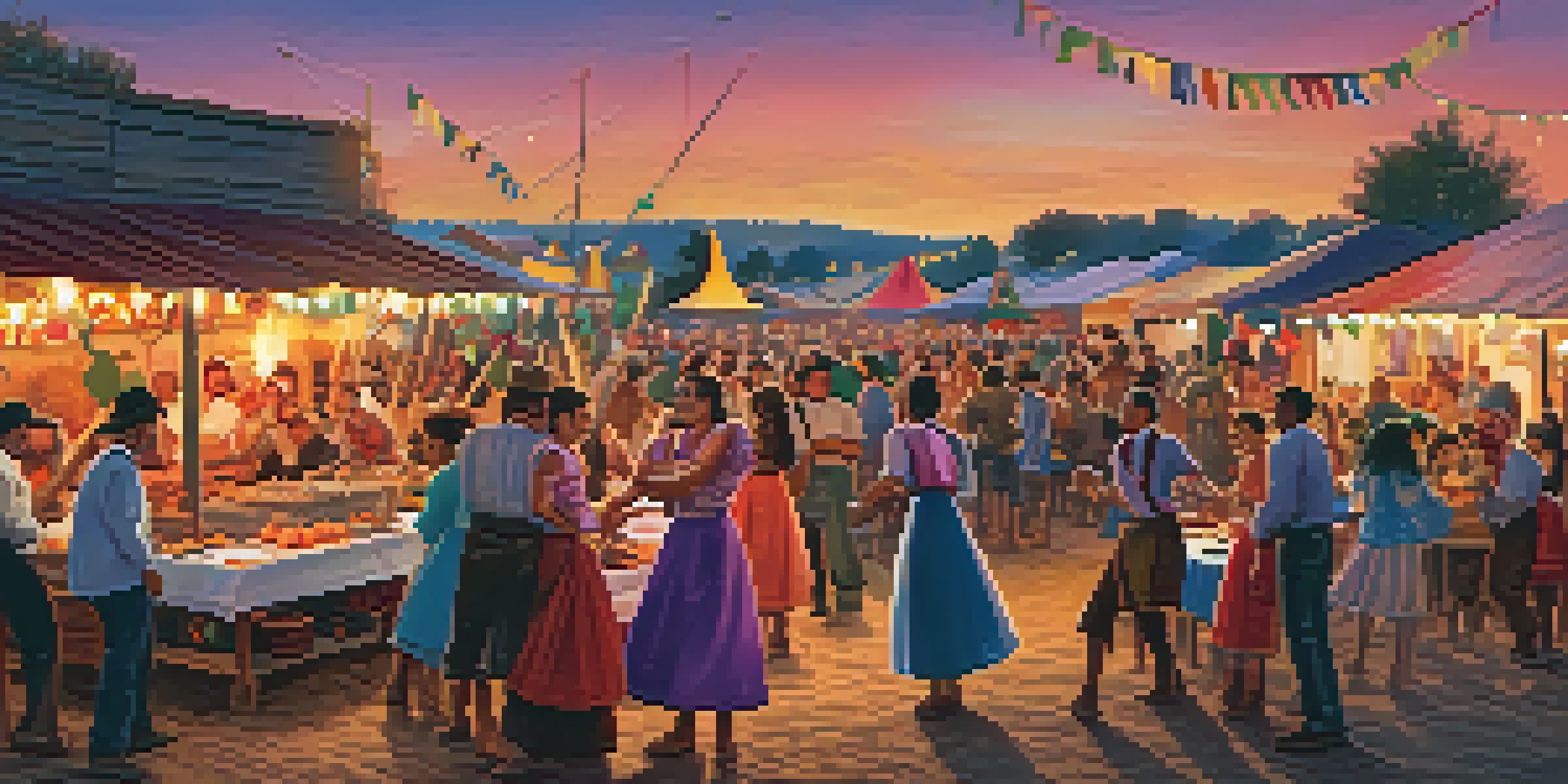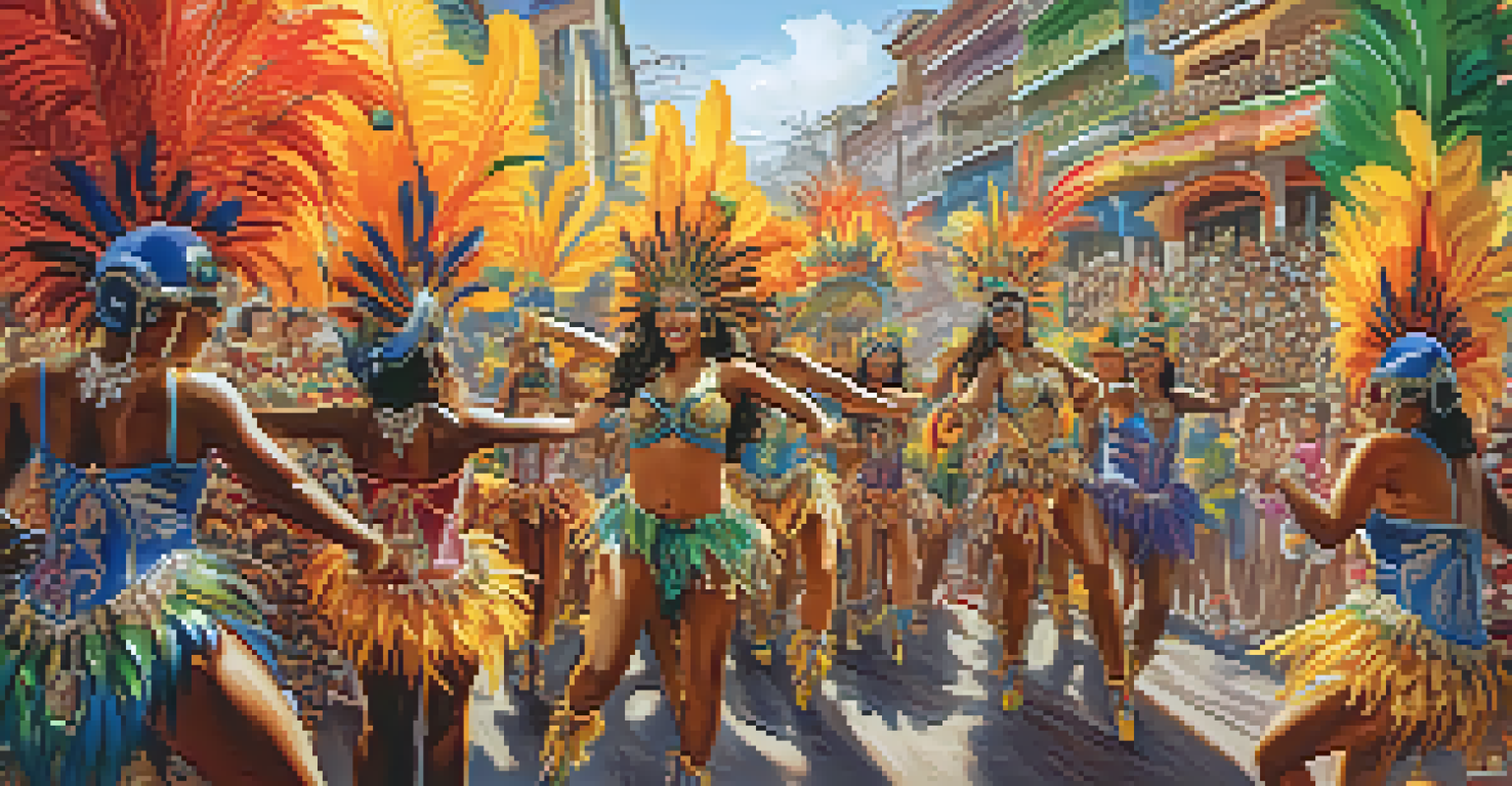Top 5 Brazilian Folklore Festivals Celebrating Cultural Heritage

1. Festa Junina: A Celebration of Rural Traditions
Festa Junina is one of Brazil's most beloved celebrations, taking place in June. It honors rural life and marks the harvest season, featuring traditional foods, music, and dances. Imagine colorful decorations, bonfires, and joyful people dressed in country attire, all coming together to appreciate the nation's agrarian roots.
Festivals are a time for celebration, a time for community, and a time for reflection on the rich cultures that shape our lives.
During this festival, you'll find classic foods like corn dishes, sweet treats, and hearty stews that reflect the bounty of the harvest. The lively quadrilha dance, with its charming choreography, invites everyone to participate, creating a sense of community and belonging. It's a delightful way to experience the warmth of Brazilian culture.
Festa Junina also serves as a reminder of Brazil's diverse regional traditions, with each area adding its unique flair. From the vibrant São João da Barra in Rio de Janeiro to the lively events in the Northeast, this festival truly celebrates the spirit of Brazilian folklore in a colorful, unforgettable way.
2. Carnaval: A World-Renowned Extravaganza
Carnaval is perhaps Brazil's most famous festival, attracting millions from around the globe. Taking place just before Lent, this euphoric celebration features parades, samba music, and dazzling costumes. Picture samba schools showcasing elaborate floats and dancers captivating audiences with their energy and rhythm.

The festival is not just a visual spectacle; it's a cultural melting pot that highlights Brazil's rich heritage. Each samba school tells a story through their performance, often drawing from historical or social themes. This artistic expression makes Carnaval a powerful platform for cultural commentary and community pride.
Festa Junina Celebrates Rural Roots
This vibrant festival honors Brazil's agrarian traditions with food, dance, and community spirit.
Beyond the parades, street parties known as blocos offer a more intimate experience, where locals and visitors dance together in vibrant neighborhoods. From Rio de Janeiro to Salvador, each city adds its unique flavor, making Carnaval a celebration of diversity and unity that embodies the heart of Brazilian culture.
3. Festa do Divino: A Spiritual and Cultural Journey
Festa do Divino, or the Festival of the Divine Spirit, is a deeply spiritual event celebrated in various regions of Brazil. This festival honors the Holy Spirit and reflects the fusion of indigenous, African, and European cultures. The vibrant processions are filled with music, dance, and colorful decorations that create a festive atmosphere.
Cultural festivals are a window into the soul of a community, revealing the traditions and stories that bind us together.
Participants often dress in traditional garb and carry banners, creating a lively procession that winds through the streets. The festival's rituals include communal prayers, offerings, and the sharing of food, showcasing the importance of community and faith in Brazilian culture. It's a beautiful example of how spirituality is woven into the fabric of everyday life.
Festa do Divino also emphasizes the importance of charity, as many festivities include food drives and community support initiatives. This blend of celebration and social responsibility illustrates the profound connection between culture and community in Brazil, making it a truly unique experience.
4. Folclore Festival: Celebrating the Legends of Brazil
The Folclore Festival, celebrated in various regions, pays homage to Brazil's rich folklore, featuring stories, songs, and dances that have been passed down through generations. This festival showcases the country's diverse cultural heritage, with performances that bring to life legends, myths, and local traditions. Imagine vibrant costumes and captivating narratives that transport you into the heart of Brazilian culture.
Throughout the festival, visitors can enjoy traditional music, art, and food, all while immersing themselves in the tales that define Brazilian identity. Local artists and performers take center stage, offering their interpretations of beloved folklore characters, such as the mischievous Saci or the enchanting Iara. This engaging atmosphere fosters a sense of pride in cultural roots.
Carnaval Showcases Cultural Diversity
Carnaval is a world-renowned celebration that combines parades, samba music, and a rich tapestry of Brazilian heritage.
The Folclore Festival also serves as an educational platform, where younger generations can learn about their heritage through engaging activities and performances. By celebrating folklore, the festival helps preserve Brazil's unique cultural identity, ensuring that these stories and traditions continue to resonate with future generations.
5. Festa de Iemanjá: Honoring the Queen of the Sea
Festa de Iemanjá is a vibrant festival celebrated in honor of the Afro-Brazilian goddess of the sea, drawing crowds to coastal cities like Salvador and Rio de Janeiro. This festival takes place on February 2nd and is marked by colorful offerings made to Iemanjá, including flowers, candles, and food, all set afloat on the ocean. It's a beautiful sight that symbolizes devotion and respect for the goddess.
Participants often wear white, a color associated with purity and peace, as they join in prayer and song. The atmosphere is filled with a sense of reverence and celebration, as people come together to express their gratitude and hopes for the coming year. The festival reflects the deep connection between Afro-Brazilian culture and the natural world, emphasizing the importance of spirituality.
Festa de Iemanjá also highlights the role of community and togetherness, as families and friends gather to celebrate their shared beliefs and cultural heritage. The festival fosters a sense of unity and belonging, making it a cherished event that resonates deeply within Brazilian society.